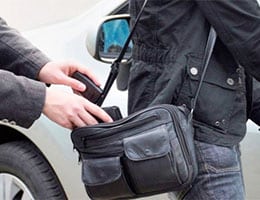 With etymological origin in the Latin word furtum , theft is a term that refers to the act of stealing : stripping someone of property without applying force to things or intimidating the owner. The notion is also used to name the stolen item and the crime that occurs when taking something in this way.
With etymological origin in the Latin word furtum , theft is a term that refers to the act of stealing : stripping someone of property without applying force to things or intimidating the owner. The notion is also used to name the stolen item and the crime that occurs when taking something in this way.
For example: "The theft of the bag was recorded on a security camera video" , "The young man was convicted of the theft of five crates of beer" , "If you are careless and do not pay attention to your belongings at the airport, It is possible that you are a victim of theft .
In the judicial field, a theft involves the illegitimate appropriation of a movable thing that, unlike what happens in a robbery or extortion, is obtained without violence or intimidating mechanisms. There are no special forms of theft, but simply taking what is illegally taken from another.
With theft, the person responsible for the crime seeks to enrich himself or make a profit . Their action is sanctioned by law , although the penalties are usually lower than those contemplated in robbery or extortion.
Let's see the differences between a theft and a robbery through an example. Suppose a person places his cell phone on a bar table and then begins to read a printed newspaper, losing sight of the device. If a person passing by the table takes the phone without the owner of the device noticing , he or she will have committed theft . On the other hand, if an individual approaches and threatens the man with a revolver , demanding that he hand over the phone, the crime will be robbery .
 It is important to highlight the absence of violence or intimidation mechanisms in theft, since these are the two fundamental aspects when it comes to differentiating it from robbery. In this framework, we must also indicate that this procedure should not always be directed at the victim but can be applied to an object, whether or not it is the belonging that the thief wishes to obtain illegally: the struggle or intentional breaking to carry out the crime. They are typical of theft.
It is important to highlight the absence of violence or intimidation mechanisms in theft, since these are the two fundamental aspects when it comes to differentiating it from robbery. In this framework, we must also indicate that this procedure should not always be directed at the victim but can be applied to an object, whether or not it is the belonging that the thief wishes to obtain illegally: the struggle or intentional breaking to carry out the crime. They are typical of theft.
That said, we can give another example in which the type of crime depends on small variables. If a person enters another's home to steal their belongings, without a doubt we know that their behavior should be considered a crime, but this information is not enough to issue a verdict in a trial. In a case like this, violence can manifest itself in several ways: the thief must force the lock to gain entry into the house; that physically confronts the owner ; that destroys part of the property while it is inside.
In turn, each of these three points can have more than one interpretation: violence when opening the door can occur with or without the owner on the other side, but it will always lead to the classification of robbery; The physical confrontation with the owner can cause damage of various degrees, or even leave him unharmed, but in all cases we will speak of robbery and not theft; The destruction of the property or damage to other belongings beyond those stolen is in itself a reason to rule out the possibility of theft, regardless of whether the owner suffers any damage in the process.
Beyond the treatment that the law applies to theft and robbery, insurance companies also differentiate them in their contracts, which is why it is important to read all the conditions to the letter.
